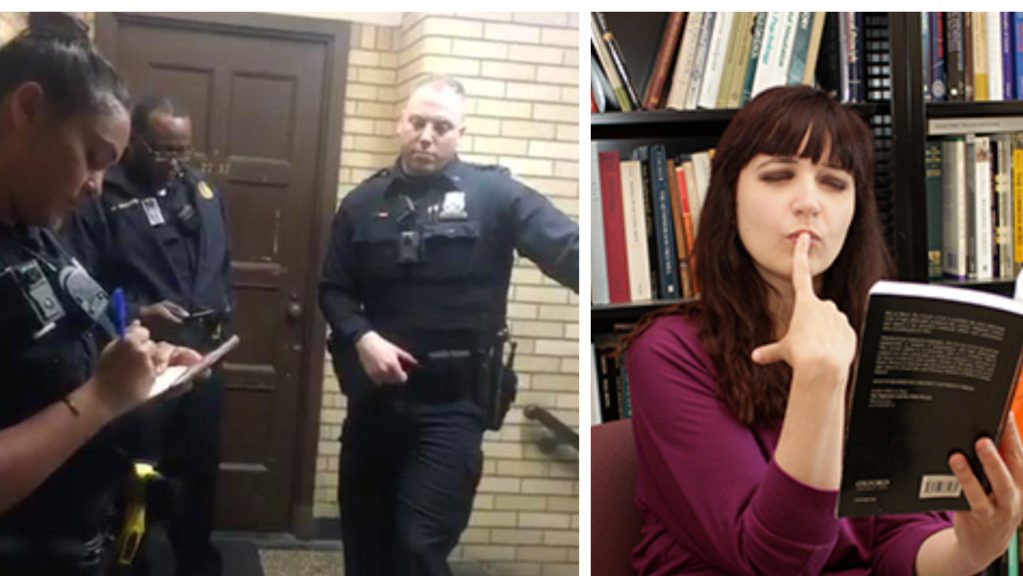After Sarah Braasch backlash for calling police on Black Yale student, websites that posted her pro-slavery, pro-hate speech writing denounce her actions
One site has removed her posts.
Two websites theGrio cited that hosted content by Sarah Braasch have distanced themselves from her words and Braasch herself.

Two websites theGrio cited that hosted content by Sarah Braasch have distanced themselves from her words and Braasch herself.
The Yale PhD student gained instant notoriety this week after news surfaced that she called the police on a Black graduate student (Lolade Siyonbola) who had fallen asleep in the common room of the residence hall where they both live. Video of Siyonbola’s nearly 20-minute encounter with police officers has gone viral.
TheGrio researched Braasch’s background and uncovered blog posts written by Braasch with controversial ideas such as making pro-slavery arguments and being against hate crime legislation.
Two of the sites that hosted the controversial content have issued statements condemning Braasch’s view points.
Daylight Atheism (a blog hosted on Patheos) published a well-written, nuanced statement detailing why not only Braasch’s writing, but her actions in the Yale dorm were unacceptable.
The statement reads in part:
“I absolutely don’t condone calling the police on a peaceful, law-abiding person of color, especially not because their mere presence makes a white person feel threatened. Sarah is a personal acquaintance and a friend of mine, but what she did in this situation was a grievous moral error, and I’m not defending it. What makes it worse is that, according to the Yale Daily News story and Siyonbola’s account, this isn’t the first confrontation of this kind that she’s instigated.
“This is a pattern of prejudice that’s still prevalent in our society. There are countless stories of white people summoning the police to harass and arrest people of color who were peacefully shopping, or driving, or sitting in a Starbucks, or sitting in their own car and reading, or waiting for a bus, or jogging, or walking, or touring a college campus, or renting a house, or almost any other mundane activity. And while this particular story ended with no physical harm done, others like it ended violently and tragically: Tamir Rice, Sandra Bland, Eric Garner, and too many others.
“For this reason, I believe that when a person of color is involved, all white people have a moral duty to treat the police as an absolute last resort, ideally reserved for cases of imminent and serious danger. Throughout American history, the police have been de facto enforcers of white supremacy, coming to hassle and bully minorities on the whim of a white person.”
The author of the post, Adam Lee, goes on to say that he is keeping Braasch’s posts on the site unless she asks for them to be removed (she owns the copyright). As of publication of this update, her posts are still on the site, but the comments are being monitored for threats.
READ MORE: Yale says police ‘admonished’ the woman who called them to remove a napping Black grad student
‘Racially offensive argumentation’
Humanist, another site that has hosted content from Braasch issued a statement as well, but it also removed Braasch’s blog post where she defended pro-slavery stances and showed support for banning burqas.
The post in question was from 2010, but Humanist contends that it was just brought to their attention that it contains “racially offensive argumentation.”
The entire Humanist statement:
“We have removed the article “Lift the Veil, See the Light” by Sarah Braasch (published in the Sept/Oct 2010 issue of the Humanist magazine) from our website after it was brought to our attention that it contains racially offensive argumentation. The article was part of a point-counterpoint on the topic of laws barring Muslim women in France from wearing face-covering veils. In the article in question, which argues for the ban, the author equates the small number of slaves who wanted to remain with their owners after emancipation (an idea that is itself still a justification for racism in some circles) with women who choose to be “slaves” in abusive, misogynistic, or otherwise patriarchal religious traditions.
“She makes this analogy–which we have judged to be inaccurate and racially offensive–to argue that if human beings are forced or conditioned to accept indignity, suffering, and an inferior position in society then that society has an obligation to make laws to correct that. While the author’s final point is one some humanists might champion, the analogy to American slavery is definitely not.
“The Humanist published two articles from this author as an outside contributor (not a staff member or regular blogger). We regret that this material remained up as long as it did and appreciate its offensive content being brought to our attention.”
